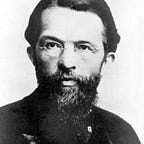Rothbard misunderstood and misrepresented Mises’s morality
Murray Rothbard in Praxeology, Value Judgments, and Public Policy (1976):
The case of Mises is particularly interesting, not only because he was a leader in the modern Austrian school and in praxeology, but also because he was, of all the economists in the twentieth century, the most uncompromising and passionate adherent of laissez-faire and at the same time the most rigorous and uncompromising advocate of value-free economics and opponent of any sort of objective ethics. How then did he attempt to reconcile these two positions?
Rothbard quotes Ludwig von Mises, from Human Action (1949):
“An economist investigates whether a measure a can bring about the result p for the attainment of which it is recommended, and finds that a does not result in p but in g, an effect which even the supporters of the measure a consider undesirable. If the economist states the outcome of his investigation by saying that a is a bad measure, he does not pronounce a judgment of value. He merely says that from the point of view of those aiming at the goal p, the measure a is inappropriate.”
Rothbard continues:
Now this is surely an ingenious attempt to allow pronouncements of “good” or “bad” by the economist without making a value judgment; for the economist is supposed to be only a praxeologist, a technician, pointing out to his readers or listeners that they will all consider a policy “bad” once he reveals its full consequences. But ingenious as it is, the attempt completely fails. For how could Mises know what the advocates of the particular policy consider desirable? How could he know what their value scales are now or what they will be when the consequences of the measure appear?
Mises says ‘if you want result p and not result g, then measure a is bad for you’. This doesn't require Mises to know who supports p or g to make such a pronouncement.
Rothbard (continuing):
[..] All sorts of such possibilities exist, and none of them is compatible with the assertion of Mises, as a value-free economist, that all supporters of price controls—or of any other government intervention—must concede, after learning economics, that the measure is “bad.” In fact, once Mises conceded that even a single advocate of price controls or any other interventionist measure may acknowledge the economic consequences and still favor it, he could no longer call any of these measures “bad” or “good” or even “appropriate” or “inappropriate” without inserting into his economic policy pronouncements the very value judgments that he himself held to be inadmissible as a scientist of human action.
If a person is aiming at shortages, and favors price controls because of it, then Mises would not call it bad for that person. Rothbard seems stuck in the idea that a measure either is or is not bad. Mises’ point is that the words good and bad are only meaningful in the context of subjective value. And because of subjective value, this leaves a large common ground for advocacy of laissez-faire, when an individual is aiming at the same things we are but misunderstands the consequences of certain policies or societal rules.
Mises:
“Liberalism, in its 19th century sense, is a political doctrine … As a political doctrine liberalism (in contrast to economic science) is not neutral with regard to values and ultimate ends sought by action. It assumes that all men or at least the majority of people are intent upon attaining certain goals. It gives them information about the means suitable to the realization of their plans. The champions of liberal doctrines are fully aware of the fact that their teachings are valid only for people who are committed to their valuational principles. While praxeology, and therefore economics too, uses the terms happiness and removal of uneasiness in a purely formal sense, liberalism attaches to them a concrete meaning. It presupposes that people prefer life to death, health to sickness … abundance to poverty. It teaches men how to act in accordance with these valuations.”
Rothbard:
In this second variant, Mises successfully escaped the self-contradiction of being a value-free praxeologist advocating laissez-faire. Granting in this variant that the economist may not make such advocacy, he took his stand as a citizen willing to make value judgments.
… for Mises the utilitarian .. he was only willing to make the one value judgment that he joined the majority of the people in favoring their common peace, prosperity, and abundance. In this way, as an opponent of objective ethics .. he made the minimal possible degree of such judgments; true to his utilitarian position his value judgment is the desirability of fulfilling the subjectively desired goals of the bulk of the populace.
… They may well decide that it is worth sacrificing a modicum of wealth and efficient production because of the high opportunity costs of not being able to enjoy an alleviation of envy, or a lust for power, or a submission to power, or, for example, the thrill of “national unity, ” which they might enjoy from a (short-lived) economic crisis.
What could Mises reply to a majority of the public who have indeed considered all the praxeological consequences and still prefer a modicum—or, for that matter, even a drastic amount—of statism in order to achieve some of their competing goals? As a utilitarian, he could not quarrel with the ethical nature of their chosen goals: for he had to confine himself to the one value judgment that he favored the majority achieving their chosen goals.
Mises did not favor the majority achieving their goals in all possible situations. Mises subjectively favored peace and prosperity. He was under the impression that the majority also favored peace and prosperity, and this provided a common ground for advocacy of laissez-faire, the unknown ideal for the achievement of peace and prosperity.
